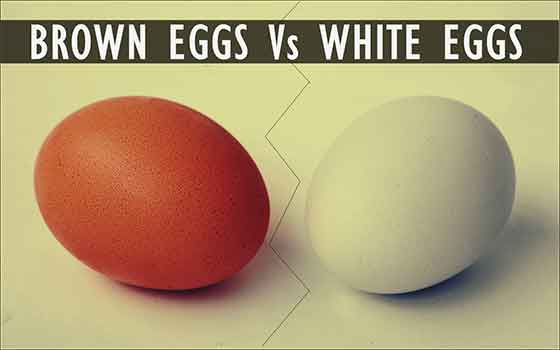Brown Vs White Eggs – What’s The Difference?

Eggs are one of the most nutritious and protein-rich foods in the whole world. Eggs are rich in proteins, minerals, vitamins, healthy fats, omega-3s, choline, and antioxidants, etc. All these nutrients are very essential in keeping our bodies fit and healthy. Some health benefits of eating eggs include cholesterol management, healthy heart, good eyesight, stronger bones, building muscles, and weight loss. However, there are still debates over the connection between egg colors and the amounts of nutrition found in a particular color. Thus, here are essential facts & information about the difference in the nutritional values of Brown Vs White eggs.

The Connection Between Eggs & Their Colors
Eggs are available in different colors like white, brown, blue, and bluish green, etc. Two of the most common among these colors are brown and white eggs. Essentially, the color difference between a brown egg and white egg depends upon the pigment produced by hens & their breed. For example, the pigment found in brown eggs is called protoporphyrin IX and the white ones have no such coloring pigment. The pigment found in the blue and bluish green eggshells is known as the biliverdin. Different colors of eggs are found in the different countries and regions of the world. Also, the colors are also affected by the diet, surroundings, anxiety levels, and age of the hens.
Nutrition Difference Between Brown & White Egg?
People all around the world argue about the nutrition difference between a brown egg and a white egg. Are brown eggs more healthy & nutrient-rich or the white ones? The white-colored eggs are produced by hens with white feathers & light-colored earlobes. On the other hand, the brown-colored eggs are produced by hens with brown feathers and reddish earlobes. Also, the size of the brown ones is a bit bigger than that of the white ones.
Usually, most of the people have a perception of brown eggs being more nutritious than white eggs. This is mainly because of the higher cost of brown ones than white ones. However, this is not actually the truth according to many different medical studies. As per these studies, the brown-colored eggs cost higher because they’re produced by hens with a bigger appetite. Thus, the expenses required to breed and bring up these hens are more than the ones required for white egg-laying hens. This is the main reason why the brown-colored ones cost higher than the white-colored ones.
If we talk about the nutritional difference, there is no difference as per most of the health experts around the world. However, some medical studies claim that the amount of Omega-3 fatty acids is more in brown ones. But if we talk about the nutrition difference between a brown egg and white egg, it’s almost insignificant. Therefore, the amount of protein, vitamins, minerals, choline, omega-3s, and antioxidants in both these egg types is almost the same
Egg Nutrition Facts
Here are the nutrition facts for different egg parts i.e. whole egg, egg yolk, and egg without yolk.
Whole Egg – Whole egg refers to the complete egg with yolk and the white part. The most common question that people ask is how much protein in 1 egg? To provide you with a better idea, here are the nutritional values of 1 whole egg.
| Whole Egg (Raw) | Whole Egg (Hard-Boiled) |
| Protein In 1 Egg – 6.3g Calories – 72 Total Fat – 4.8g Saturated Fat – 1.6g Polyunsaturated Fat – 1g Monounsaturated Fat – 1.8g Cholesterol – 0.19g Sodium – 0.071g Potassium – 0.069g | Protein In 1 Egg – 6.3g Calories – 77 Total Fat – 5.3g Saturated Fat – 1.6g Polyunsaturated Fat – 1.1g Monounsaturated Fat – 2g Cholesterol – 0.21g Sodium – 0.072g Potassium – 0.070g |
Egg Without Yolk – Egg white refers to the part of the egg without the yolk. This portion is said to have higher amounts of protein and lesser calories than then yolk. So let’s check out the nutritional values, especially how much protein in 1 egg without yolk?
| 1 Egg Without Yolk (33g) |
| Protein In 1 Egg Without Yolk – 3.8g Calories – 17 Total Fat – 0.1g Saturated Fat – 0g Polyunsaturated Fat – 0g Monounsaturated Fat – 0g Cholesterol – 0g Sodium – 0.055g Potassium – 0.054g |
Egg Yolk – The yellow part of the egg is known as the egg yolk. Egg yolk is known to have more calories and a lesser amount of protein. Let’s check out the nutritional values, especially how much protein in 1 egg yolk?
| 1 Egg Yolk (33g) |
| Protein In 1 Egg Yolk – 2.2g Calories – 55 Total Fat – 4.5g Saturated Fat – 1.6g Polyunsaturated Fat – 0.7g Monounsaturated Fat – 2g Cholesterol – 0.18g Sodium – 0.008g Potassium – 0.018g |
Which Portion Of Egg To Eat With Cholesterol Problem?
People with cholesterol problems always check every food’s nutritional values to know the amount of cholesterol present. This is because high cholesterol foods can easily elevate LDL levels and increase the chances of heart disorders. Thus, people always wonder which part of the egg to eat with a cholesterol problem, i.e. yolk or white part. Well, all the medical studies have shown that only the egg yolk contains cholesterol. As a matter of fact, there’s only 0.19g of cholesterol in one egg yolk.
However, if we talk about the risks of eating eggs for people with cholesterol, they’re minimal. In several medical studies, eggs were found to minimally affect cholesterol levels. But, you have to eat eggs in a lesser quantity i.e. 7-8 eggs per week. On the other hand, people with diabetes need to avoid eating eggs as it can easily lead to heart-related problems. Thus, you can either eat the white part of the egg or eat whole eggs in lesser quantity. Furthermore, it’s highly recommended to ask a licensed dietician before you start eating eggs.
The Bottom Line!
So this was everything you need to know about the nutrition difference of Brown Vs White Eggs. Eggs are an excellent source of essential nutrients that offer several health benefits. Furthermore, these are an economical source of proteins that help in building muscles and strengthening of the bones. Also, eggs are easily available in every part of the world. However, there is no nutritional difference between brown & white eggs.



